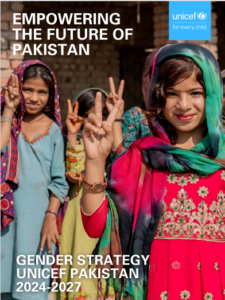Pakistan – Possible Options & Roadmap for Social Empowerment
UNICEF Pakistan’s Gender Strategy puts the socio-ecological model at the centre of its framework to address inequalities, and socio-cultural, and structural barriers that hamper girls’ and boys’ equitable access to social services.

This strategy will uplift the value and agency of adolescent girls through a child-centred, gender-responsive, and inclusive approach across all key sectors where UNICEF is working closely with the Government of Pakistan.
The comprehensive strategic frameworks outlined by UNICEF in its Country Programme Document (CPD) for 2023-2027 and the Gender Action Plan (GAP) 2022-2025 are vital blueprints for tackling gender disparities and promoting gender equality in diverse contexts across the country.
Within this global framework, national and provincial barriers were identified across Pakistan — some of which include the need for the effective implementation of policies; glaring gaps in gender-disaggregated data; a lack of gender-sensitive educational structures; and inadequate child protection measures.
These barriers reflect the urgent need for targeted, culturally cognizant, and inclusive approaches that do not forget differently-abled children, adolescent girls, and women.
These approaches aim to dismantle deeply entrenched discriminatory norms based on approved ideals of masculinity and femininity that foster cultural and societal imbalance. Acknowledging the enduring and cross-generational effects of gender discrimination, this strategy aims to promote a gender-equitable approach to programming across all stages of life.
Simultaneously, it advocates for community system-strengthening initiatives, including women-, adolescents-, and girls-led initiatives to enhance the leadership of adolescent girls, recognizing their vulnerability to gender inequalities, and their potential as catalysts for change in the future.
This comprehensive strategy not only addresses the visible outcomes of gender inequality but also confronts its root causes by involving boys and men as allies; advocating for early-stage funding and policy measures; and measures towards empowering girls to express their agency and opinions.
The realization of the rights of women and girls is key to ending extreme poverty and achieving the Sustainable Development Goals (SDGs) that demand bold actions to remove the systemic barriers that prevent women and girls from meaningfully participating in all areas of life.
The strategy has been developed based on a deepening understanding of gender equality within UNICEF through insights gained from past gender action plans; gender program reviews; and thorough consultations at the provincial level with staff, partners, adolescent girls, and transgender individuals.
Moving forward, the strategy will remain focused on strengthening, scaling up, and sustaining gender-equitable approaches to programming.
Collaborating with the government and other partners, UNICEF will enhance and broaden initiatives to produce, assess, and utilize gender[1]related evidence and data to track progress and to guide national accountability efforts.
This strategy outlines key interventions that can help UNICEF and its partners work towards an integrated and holistic approach rather than focusing on service delivery only, where everyone benefits and no one is left behind. This strategy positions UNICEF’s work as being with, for, and by adolescent girls as it focuses on the critical importance of dismantling the power structures that hold their potential back.
It outlines the necessary steps to enhance advancements in gender equality across the five Goal Areas of the UNICEF Strategic Plan, 2022–2025, and within existing institutional structures. It also emphasizes the organization’s role as a partner of the Government of Pakistan and its focus on advancing the 2030 Agenda for Sustainable Development.
